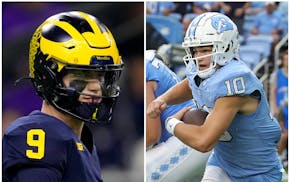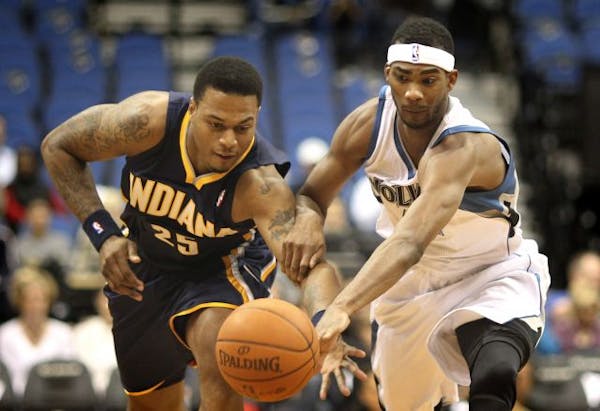One minute remained on the game clock and his team held a comfortable lead, so Royce White thought he'd treat the crowd to a showboat move.
Alone on a fast break, White tossed the ball off the backboard and leapt to throw down a thunderous, one-handed dunk. Except his timing was a smidgen off, so he had to settle for a layup, drawing a mixture of laughs and wisecracks and a wry smile from White.
It was 10 p.m. with about 200 people in attendance at a suburban Twin Cities gym.
Facing a bunch of college players in the Howard Pulley Summer League, White was the main attraction and, at 6-8 and 260 pounds, he wasn't hard to spot. He looked like Shrek on a basketball court with his imposing presence.
He scored 24 points but could have finished with 80, if he wanted. He zipped one bounce pass from half-court through traffic to a cutting teammate for a layup. He made a deep three-pointer, played point guard and posted up whenever he felt like shooting a layup.
Amid the oohs and aahs, I kept thinking to myself, hopefully this isn't as good as it gets.
White belongs in the NBA. He's too skilled and too powerful to see his talent go to waste. But his future as a professional basketball player remains murky as he attempts to forge a career while remaining steadfast in his conviction that his mental health issues take precedence over everything.
A first-round draft pick last summer, White already has a new team after the Houston Rockets traded him to Philadelphia earlier this month in a divorce that seemed inevitable. A change of address gives the appearance of a fresh start, but the uncertainty surrounding his medical situation raises skepticism that the outcome actually will be different.
"I think realistically it's hard to look ahead just given the past year," White said this week. "You don't want to get too ahead of yourself in terms of your own expectations, especially when it has so much to do with other people's actions."
White became a lightning rod in NBA circles during a rookie season that saw him play zero games but make headlines from coast to coast. His anxiety disorder — which is manifested in a fear of flying, among other things — created a well-documented dispute with the Rockets organization over the scope of his medical care.
White reiterated that he's willing to fly on those occasions when traveling on a bus is not realistic. His concern, he said, rests with how his team and the NBA handle situations in which his anxiety disorder prevents him from flying and he misses a game. He believes those situations should be classified as a legitimate medical reason and not an unexcused absence, thus subjecting him to discipline.
"The medical people who are in the medical field would advocate that, if I'm having some anxiety issues or some stress issues related to my disorder, that would be considered a medical excuse," he said. "Obviously there are people who feel otherwise. It's really complex, but those are the facts."
White's stance seemingly lacks any real gray area in public opinion. Critics accuse him of being a con artist. Supporters view him as a staunch advocate hellbent on using his platform to raise awareness for mental illness.
I won't pretend to know the depth of White's condition or his struggles. Only he knows that. That he's willing to jeopardize a lucrative career suggests his issues are far more serious than the casual perception that he's nothing more than a nervous flier.
But his employers are in a tough spot, too. Consistency and reliability are hallmarks that every sports franchise seeks from its athletes. Teams make a significant financial investment in players, and they need to be able to count on them.
What makes this situation so unique is that it involves mental health. By nature, professional athletes are conditioned to conceal any perceived weakness or vulnerability. Here is an NBA player acknowledging a mental disorder that occasionally impacts his ability to function.
"A player like myself will never be fully supported the way they need to be until the NBA steps in and makes it a priority," he said. "That means you have to actually go and do the work. You have to bring the coaches up to speed on what mental health is all about and what we know about it today. We have seminars at the beginning of each rookie season about drugs and alcohol abuse and money management [but] not mental health. It's a big gap and a lot of stigma to the topic."
White hopes a new start in Philadelphia will enable him to play basketball and continue to serve as an advocate. He believes the geographic proximity of Sixers' opponents on the East Coast will present more flexible travel arrangements. Hopefully the two sides can find common ground on a workable plan.
White showed this week that he can dominate a summer league game. Now it would be nice to see him against actual NBA competition.
Chip Scoggins ascoggins@startribune.com.

Scoggins: Finch feeling heat of the Suns as playoff battle looms
Scoggins: Why 'championship or bust' fits these Wolves

Scoggins: Anatomy of a game-saving play as Correa throws out Ohtani


